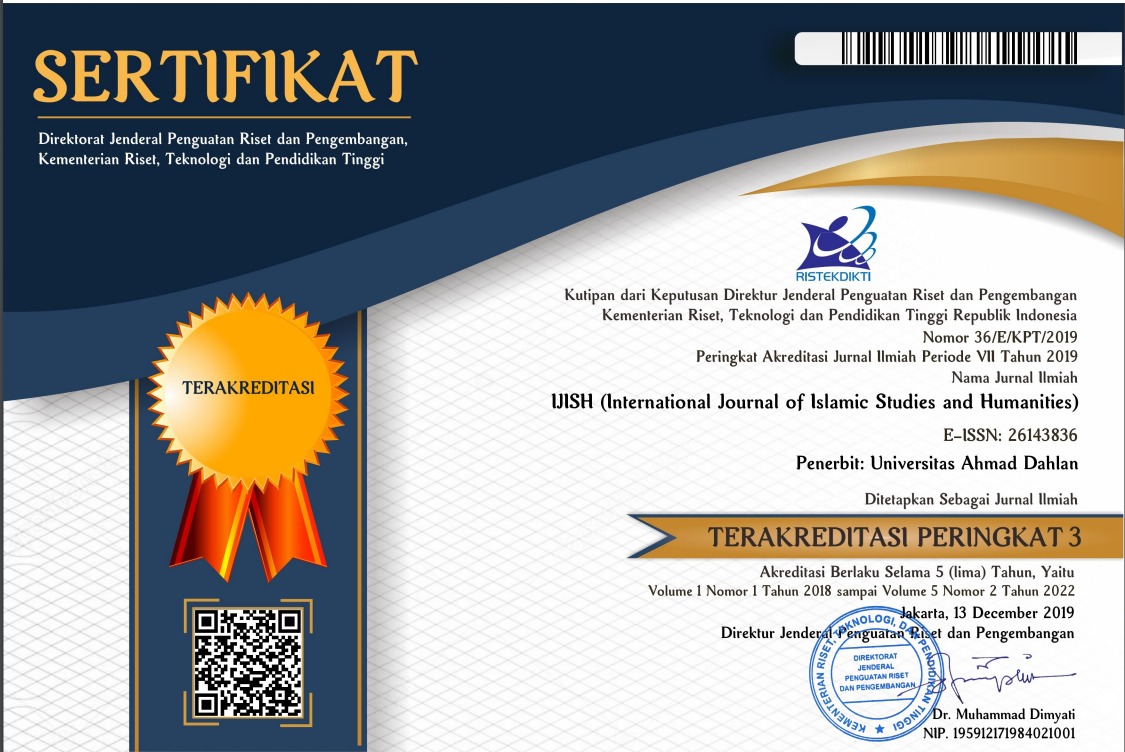Madkhali’s criticism of Sayyid Quṭb: a critique of the critique
DOI:
https://doi.org/10.26555/ijish.v6i2.9200Keywords:
Madkhali , Sayyid Qutb , Criticism , CritiqueAbstract
From the 60s of the 20th century, the works of Sayyid Quṭb have enormous influence on the thought of Muslim youths and Islamists. The core message of his works is establishing the supremacy of Islamic law in all facets of life and outright condemnation of the subsisting order of the day concerning the political and socio-economic operations in Muslim nations. The effect of his thoughts on Muslim youths is visible in the resurrection of Islamists who have become a thorn in the flesh of political dictators and autocratic monarchs in Arabia. As part of efforts to neutralize the effects of Quṭb’s works on the ever-increasing Muslim youths in Saudi particularly and the Muslim world at large, Rabi’u Madkhali, a senior Salafi diehard with much influence in Madinah, kickstarted the project of refuting what he termed as "theological deviations” and “rebellious approach” in Quṭb’s thoughts. His works have given birth to a large number of Muslim youths who dedicate an extraordinary commitment to pathological hatred for Quṭb, his works, associates, and students. This article aims to criticize some submissions of Madkhali on Quṭb’s thought. The article which is library-based adopts an analytical method of research. Two issues, which include law enactment in a Muslim state and the abolition of the slavery system, are selected. The paper found that Madkhali’s refutations are highly characterized by accusations that need unequivocal proof, misinterpretation of Quṭb’s statements, and emotional submissions. It recommends further investigation into other Madkhali’s refutation of Sayyid Quṭb.
References
References
Ab Rahman, A. H., Ahmad, W. I. W., & Ali, N. (2011). Fi Zilal Al-Qur’an: Sayyid Qutb's Contemporary Commentary On The Qur'an. International Journal of Business and Social Science, 2(12), 281–288.
Abū Dāud, S. (2006). Sunan Abῑ Dāud. Al-Maktabat al-Asriyah.
Ali, N., & HJ Ab Rahman, A. (2012). From Quranic literary studies to socio-religious commitment: Sayyid Qutb’s socio-political orientation. International Journal of Humanities and Social Science 2: 15, 2(15), 291–295.
Ali, N., Rahman, A. H. A., Ahmad, W. I. W., & Mohamad, M. Y. (2011). From Religious Realism to Social Criticism: Sayyid Qutb’s Approach in Fi Zilal al Qur’an. International Journal of Humanities and Social Science, 1(8), 258–263.
Al-Mawardi, A. al-H. (2005). Al-Ahkām as-Sultāniyyah. Dārul Hadith.
Arikewuyo, N. A. (2019). A Comparative Study of Revivalist Da’wah Approach of Salafiyyah and Muslim Brotherhood-Oriented Groups in Yorubaland. Kwara State University, Malete, Nigeria.
Arikewuyo, N. A. (2022). Politicization of Religion and Religionization of Politics in Islam: The Madkhaliyah and Surūriyah Narratives as Case-Studies. Journal of Usuluddin, 50(2), 113–122. https://doi.org/10.22452/usuluddin.vol50no2.7
Ashmawi, S. (1969). Al-Ālim ar-Rabbāni ash-Shahῑd Sayyid Quṭb.
Bahansāwi, S. (1989). Shubuhāt Ḥawla al-Fikr al-Islāmi. Daru al-Wafa.
Dawālῑbi, M. M. (2002). Ad-Dawlah Was Sulṭah fi al-Islām. Dar ash-Shawaf.
Hudaybi, H. (1972). Du’atun La Qudatun. Hadyu Muhammadi.
Ibn Kathῑr, I. (1999). Tafsῑr Ibn Kathῑr. Darul Kutub al-’Ilmiyah.
Imārah, M. (2011). Ihyāu al-Khilāfat al-Islāmiyyah. Darus Salam.
Kamali, M. H. (2003). Principles of Islamic Jurisprudence. The Islamic Text Society.
Khallaf, A.-W. (2014). As-Sulṭāt ath-Thalāth fi al-Islām. Dar Ibn al-Jawzi.
Madkhali, R. bin H. (1992). Ṣadd Cudwān al-Mulḥidῑn. Dar at-Turath.
Madkhali, R. bin H. (2001). Al-’Awāṣim mimmā fῑ kutub Sayyid mina'l Qawāṣim. Maktabatu’l Furqan.
Mushāri, S. (2019). Al-Jāmiyyah fi al-Mῑzān.
Muslim, H. (2006). Ṣaḥῑḥ Muslim. Dar Iḥyā’ at-Turath.
Nafia, I., & Gumiandari, S. (2019). The Root of Islamic Fundamentalism in The Political Thoughts of Al-Maududi and Sayyid Qutb: A Historical Study. Jurnal Tamaddun : Jurnal Sejarah Dan Kebudayaan Islam, 7(2), 258–277. https://doi.org/10.24235/tamaddun.v7i2.5497
Nigeria, D. I. of. (2019). Shari’ah Intelligence. Amal Printing Press.
Qaradawi, Y. (1994). Al- Ijtihād al-Mu῾āṣir Baynal Inḍibāṭ Wal Infirāt. Dar at- Tawzi’ Wah-Nashri.
Qaradawi, Y. (2005). As-Siyasat ash-Shar’iyyah. Maktabat Wahbah.
Qaradāwi, Y. (1999). Al-Ikhwān al-Muslimūn. Maktabat Wahbah.
Quṭb, S. (1997). Al-’Adalat al-Ijtima'iyyah. Maktabat Wahbah.
Quṭb, S. (1998). fi Ẓilāl al-Qur’ān. Maktabat Wahbah.
Rahim, A. (1981). Islamic History. Islamic Publications Bureau.
Sābiq, S. (1983). Fiqh as-Sunnah. Maktabat Dar at-Turat.
Soage, A. B. (2009). Islamism and Modernity: The Political Thought of Sayyid Qutb. Totalitarian Movements and Political Religions, 10(2), 189–203. https://doi.org/10.1080/14690760903119092
Tommy, L. (2017). Hassan al-Banna and Sayyid Qutb: A Comparative Analysis. University of Oslo.
Toth, J. (2013). Sayyid Qutb: The Life and Legacy of a Radical Islamic Intellectual. Oxford University Press. https://doi.org/10.1093/acprof:oso/9780199790883.001.0001
Ubayd, I. (2006). Adwāu cala Shicar al-Islām Huwa al-Hill. Darul Ibda’.
Ushama, T. (2007). Extremism in the Discourse of Sayyid Quṭb: Myth and Reality. Intellectual Discourse, 15(2), 167–198.
Yusuf, B. ’Lanre. (2009). Sayyid Qutb: A Study of His Tafsir. Islamic Book Trust.
Zenishek, S. (2013). Sayyid Qutb’s Milestones, and its Impact on the Arab Spring. Small Wars Journal, 1, 1–10.
Downloads
Published
How to Cite
Issue
Section
License
Copyright (c) 2023 Nafiu Ahmed Arikewuyo

This work is licensed under a Creative Commons Attribution-ShareAlike 4.0 International License.
Authors who publish with IJISH (International Journal of Islamic Studies and Humanities) agree to the following terms:
- Authors retain copyright and grant the journal right of first publication with the work simultaneously licensed under a Creative Commons Attribution License (CC BY-SA 4.0) that allows others to share the work with an acknowledgment of the work's authorship and initial publication in this journal.Â
- Authors are able to enter into separate, additional contractual arrangements for the non-exclusive distribution of the journal's published version of the work (e.g., post it to an institutional repository or publish it in a book), with an acknowledgment of its initial publication in this journal.
- Authors are permitted and encouraged to post their work online (e.g., in institutional repositories or on their website) prior to and during the submission process, as it can lead to productive exchanges, as well as earlier and greater citation of published work.

This work is licensed under a Creative Commons Attribution-ShareAlike 4.0 International License.






